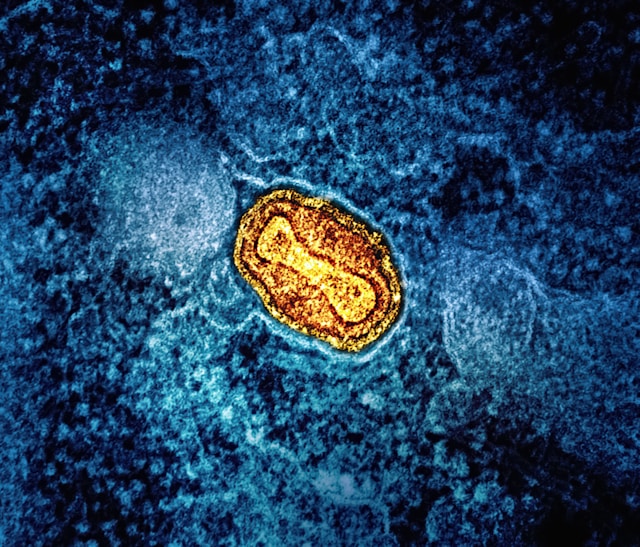Indian airports and borders are on high alert as the World Health Organization declares mpox a global health emergency amid rising international cases
India has heightened its alert level across airports, ports, and borders following a global uptick in monkeypox (mpox) cases. The World Health Organization (WHO) has declared mpox a public health emergency, prompting Indian authorities to implement stringent measures to prevent the disease’s spread.
On August 19, 2024, the Indian government directed enhanced surveillance at key entry points, including airports and land borders with Bangladesh and Pakistan. This move aims to identify and manage incoming passengers exhibiting symptoms of mpox, a viral disease that has recently seen a resurgence in several regions worldwide.
Embed from Getty ImagesThe Centre has designated three state-run hospitals in Delhi—Ram Manohar Lohia Hospital, Safdarjung Hospital, and Lady Hardinge Hospital—as primary facilities for the quarantine, management, and treatment of mpox patients. These hospitals are tasked with handling potential cases and will act as nodal centers for mpox response within the capital.
In a meeting chaired by PK Mishra, Principal Secretary to Prime Minister Narendra Modi, officials reviewed the country’s preparedness and response strategies for mpox. Despite the global increase in cases, Indian officials have reported no new mpox cases within the country at present. According to current assessments, the risk of a large-scale outbreak with sustained transmission in India remains low.
The WHO’s declaration of mpox as a public health emergency underscores the severity of the situation. The virus strain circulating now is noted to be more virulent and infectious compared to previous strains. However, Indian health officials remain cautiously optimistic about the situation, noting that the risk of widespread transmission remains minimal based on current data.
The Health Ministry has mandated that the network of testing laboratories across the country be fully prepared for rapid diagnosis of mpox. Currently, 32 laboratories in India are equipped to test for the virus, ensuring that cases can be promptly identified and managed.
Globally, the mpox outbreak has been significant, with the WHO reporting 99,176 cases and 208 deaths across 116 countries since 2022. The Democratic Republic of Congo has experienced a steady increase in cases, with global figures surpassing last year’s totals. This year alone has seen over 15,600 cases and 537 deaths worldwide.
In India, mpox has been present since 2022, with at least 30 reported cases. The most recent case was detected in March 2024. The government’s proactive measures reflect the seriousness of the situation and aim to prevent a resurgence of the disease within the country.
Analysis
Political
The Indian government’s decision to elevate alert levels reflects a significant political response to a global health crisis. By actively monitoring and preparing for mpox cases, the Indian administration demonstrates its commitment to public health and safety. This proactive stance helps bolster the government’s image domestically and internationally as a responsible and vigilant entity in managing health emergencies. Furthermore, it aligns with global health guidelines and strengthens diplomatic relations with neighbouring countries through cooperative surveillance efforts.
Social
Socially, the rise in mpox cases and the subsequent alert have heightened public awareness and concern. The Indian government’s measures, including the designation of specialized hospitals and enhanced border checks, aim to mitigate public anxiety and prevent misinformation. The situation underscores the importance of effective communication and public health education in managing disease outbreaks. The heightened alert may also affect travel plans and public behavior, as individuals become more cautious about potential health risks.
Racial
Mpox, predominantly affecting populations in Africa and now spreading globally, highlights racial disparities in disease impact and response. The current outbreak has predominantly affected countries with less robust healthcare infrastructure, raising concerns about global health equity. India’s response to the outbreak includes measures that reflect a commitment to addressing health concerns irrespective of geographic or racial boundaries. However, it also draws attention to the need for equitable global health strategies that consider the disparate impacts of such diseases across different regions.
Gender
The impact of mpox and the response measures may also have gendered implications. In many cultures, women are often primary caregivers and may bear the brunt of managing health crises within families. Increased surveillance and quarantine measures could disproportionately affect women, particularly in terms of their roles in household management and healthcare. Ensuring that gender-sensitive approaches are integrated into health responses can help address these disparities and provide more equitable support.
Economic
Economically, the alert for mpox has implications for both the healthcare system and broader economic activities. The cost of heightened surveillance, increased testing, and potential quarantines can strain public health budgets. Additionally, the potential impact on international travel and trade could have financial repercussions. The Indian government’s swift action aims to minimize these economic disruptions by preventing a large-scale outbreak that could lead to more extensive economic consequences.
